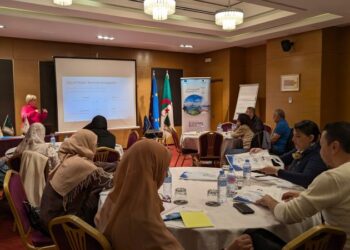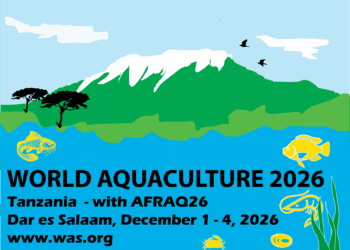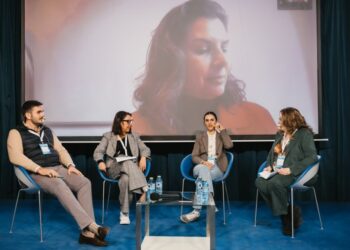Wasseem Emam leads ethical change in African aquaculture _ Wasseem Emam is helping transform Africa’s aquaculture industry by putting animal welfare at the heart of sustainable production. Upon moving to Canada, he trained as an aquatic ecologist, pouring his energy into the conservation of fish in freshwater ecosystems. Working in environmental biomonitoring and sustainable fisheries in a number of national and international government agencies, he built a foundation in both fish behavioural ecology and applied resource management. But over time, he realised that the biggest human impact on aquatic animals wasn’t in conservation but in farming. This insight led him to focus on animal welfare in aquaculture, a field he describes as “neglected but crucial,” where science and practice can come together to reduce animal suffering at scale.
“The great thing about farmed fish welfare is that it is one of those rare scenarios where we can score win-wins for farmers and animals alike,” Wasseem states.

From aquatic ecologist to aquatic animal advocate
Wasseem’s turning point came during the fieldwork of his PhD project at Stirling University, when he was tasked with coming up with ways to assess the welfare of farmed Nile tilapia in the delta region of his native Egypt. “Seeing the gap between scientific knowledge and everyday farming practices led me to devote my career to bridging it,” he says.
This realisation sparked the creation of Ethical Seafood Research (ESR), a nonprofit designed to combine applied research with practical engagement.
“I saw a need for an organisation that could rally producers, consumers, retailers and decision-makers around the issue of aquatic animal welfare, and around solutions that were both evidence-based and workable,” Wasseem explains.
Ethical Seafood Research in action
ESR’s mission is clear: to make aquatic food production more humane, ethical, and cruelty-free. The organisation generates field-based evidence, helps farmers adopt higher-welfare practices, and supports governments and companies in setting industry-leading standards.
“Our impact has been to make aquatic animal welfare visible in places where it was previously absent,” Wasseem notes.
The ‘Tilapia Welfare Egypt’ project
Egypt is the world’s third-largest producer of farmed Nile tilapia, yet significant challenges lie in terms of water supply, availability of high quality nutrition, and animal health and welfare. In terms of animal welfare improvements, the main obstacles to implementation include lack of awareness, limited technical capacity, and pressure on farmers to keep costs low. Infrastructure and market dynamics are also geared towards quantity rather than quality, making humane practices harder to introduce. As such, the huge potential for win-win welfare interventions remains largely untapped.
“I wanted to show that improvements could be made even in a largely traditional, resource-constrained context and that fish welfare doesn’t have to be a luxury,” Wasseem says.
The ‘Tilapia Welfare Egypt’ project, launched in mid-2023, works directly with farmers to trial practices and gather data, while engaging the aquatic veterinary sector, universities, and NGOs to integrate welfare into both training and practice.
One stand-out milestone of this project has been the rollout of FAI’s Tilapia Welfare App, a tool that allows farmers to monitor and improve welfare indicators on their farms. “It’s a small but important step in building practical awareness and shifting practices,” Wasseem explains.

Expanding impact beyond Egypt
The success of the Tilapia Welfare Egypt project quickly spread to other regions such as Kenya and Tanzania, and now Uganda and Nigeria. This approach — that relies on working with local partners to roll out the FAI app — demonstrates that aquatic animal welfare can be tracked and improved across different African contexts.
“Farmers themselves have reported that it helps them spot issues earlier and reduce mortality,” Wasseem says proudly.
Advice and vision
For students or early-career professionals interested in improving the welfare of aquatic animals, Wasseem offers simple guidance: “Be open-minded, try to work across disciplines, and don’t be afraid to focus on areas that seem neglected and ignored. Fish welfare may not sound glamorous, but it’s a great example of an area where big impact is possible.”.
Looking to the future, Wasseem envisions a world where animal welfare is part of mainstream sustainability. “Just as cage-free became a baseline for egg production in many parts of the world, welfare monitoring and humane slaughter can and will become standard in aquaculture. Given the current starting point and state of the sector, the shift in Egypt, and Africa in general, may be a bit more gradual, but globally the direction of travel is clear,” he concludes.
Wasseem’s work reminds us that sustainability isn’t just about the environment and the wise use of resources — it’s also about ethics and social acceptability. By adopting a One Welfare lens, he is igniting a quiet revolution in both Egyptian and African aquaculture more broadly, and setting an example for humane, sustainable food production around the world.
Wasseem Emam leads ethical change in African aquaculture.








